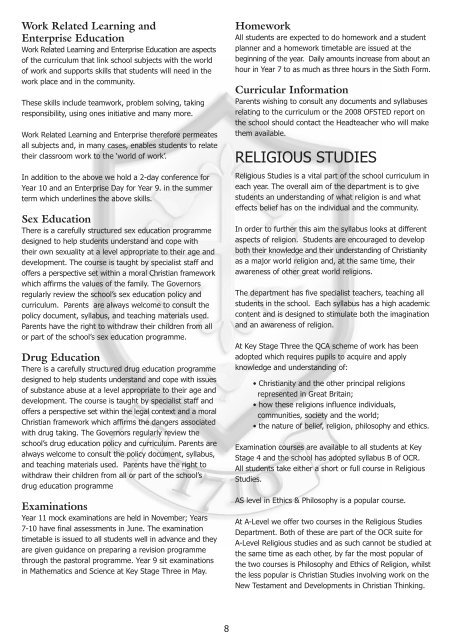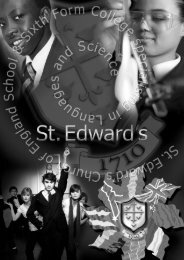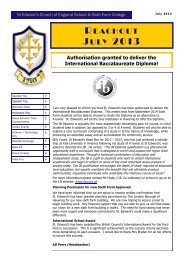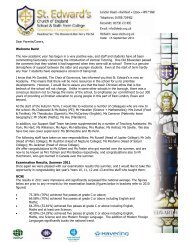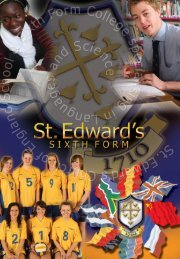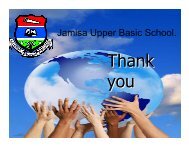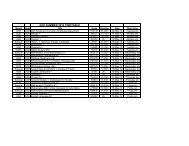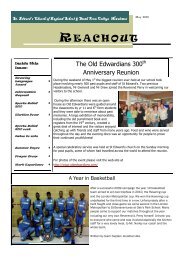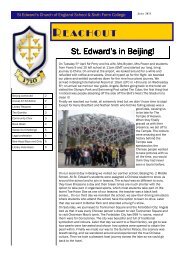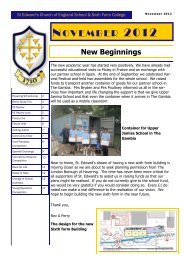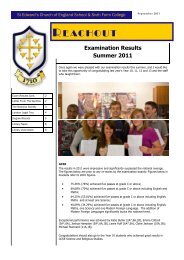St Edwards 8 Pages 09 - 25459:Layout 1 - St Edward's C of E School
St Edwards 8 Pages 09 - 25459:Layout 1 - St Edward's C of E School
St Edwards 8 Pages 09 - 25459:Layout 1 - St Edward's C of E School
Create successful ePaper yourself
Turn your PDF publications into a flip-book with our unique Google optimized e-Paper software.
Work Related Learning andEnterprise EducationWork Related Learning and Enterprise Education are aspects<strong>of</strong> the curriculum that link school subjects with the world<strong>of</strong> work and supports skills that students will need in thework place and in the community.These skills include teamwork, problem solving, takingresponsibility, using ones initiative and many more.Work Related Learning and Enterprise therefore permeatesall subjects and, in many cases, enables students to relatetheir classroom work to the ‘world <strong>of</strong> work’.In addition to the above we hold a 2-day conference forYear 10 and an Enterprise Day for Year 9. in the summerterm which underlines the above skills.Sex EducationThere is a carefully structured sex education programmedesigned to help students understand and cope withtheir own sexuality at a level appropriate to their age anddevelopment. The course is taught by specialist staff and<strong>of</strong>fers a perspective set within a moral Christian frameworkwhich affirms the values <strong>of</strong> the family. The Governorsregularly review the school’s sex education policy andcurriculum. Parents are always welcome to consult thepolicy document, syllabus, and teaching materials used.Parents have the right to withdraw their children from allor part <strong>of</strong> the school’s sex education programme.Drug EducationThere is a carefully structured drug education programmedesigned to help students understand and cope with issues<strong>of</strong> substance abuse at a level appropriate to their age anddevelopment. The course is taught by specialist staff and<strong>of</strong>fers a perspective set within the legal context and a moralChristian framework which affirms the dangers associatedwith drug taking. The Governors regularly review theschool’s drug education policy and curriculum. Parents arealways welcome to consult the policy document, syllabus,and teaching materials used. Parents have the right towithdraw their children from all or part <strong>of</strong> the school’sdrug education programmeExaminationsYear 11 mock examinations are held in November; Years7-10 have final assessments in June. The examinationtimetable is issued to all students well in advance and theyare given guidance on preparing a revision programmethrough the pastoral programme. Year 9 sit examinationsin Mathematics and Science at Key <strong>St</strong>age Three in May.HomeworkAll students are expected to do homework and a studentplanner and a homework timetable are issued at thebeginning <strong>of</strong> the year. Daily amounts increase from about anhour in Year 7 to as much as three hours in the Sixth Form.Curricular InformationParents wishing to consult any documents and syllabusesrelating to the curriculum or the 2008 OFSTED report onthe school should contact the Headteacher who will makethem available.RELIGIOUS STUDIESReligious <strong>St</strong>udies is a vital part <strong>of</strong> the school curriculum ineach year. The overall aim <strong>of</strong> the department is to givestudents an understanding <strong>of</strong> what religion is and whateffects belief has on the individual and the community.In order to further this aim the syllabus looks at differentaspects <strong>of</strong> religion. <strong>St</strong>udents are encouraged to developboth their knowledge and their understanding <strong>of</strong> Christianityas a major world religion and, at the same time, theirawareness <strong>of</strong> other great world religions.The department has five specialist teachers, teaching allstudents in the school. Each syllabus has a high academiccontent and is designed to stimulate both the imaginationand an awareness <strong>of</strong> religion.At Key <strong>St</strong>age Three the QCA scheme <strong>of</strong> work has beenadopted which requires pupils to acquire and applyknowledge and understanding <strong>of</strong>:• Christianity and the other principal religionsrepresented in Great Britain;• how these religions influence individuals,communities, society and the world;• the nature <strong>of</strong> belief, religion, philosophy and ethics.Examination courses are available to all students at Key<strong>St</strong>age 4 and the school has adopted syllabus B <strong>of</strong> OCR.All students take either a short or full course in Religious<strong>St</strong>udies.AS level in Ethics & Philosophy is a popular course.At A-Level we <strong>of</strong>fer two courses in the Religious <strong>St</strong>udiesDepartment. Both <strong>of</strong> these are part <strong>of</strong> the OCR suite forA-Level Religious studies and as such cannot be studied atthe same time as each other, by far the most popular <strong>of</strong>the two courses is Philosophy and Ethics <strong>of</strong> Religion, whilstthe less popular is Christian <strong>St</strong>udies involving work on theNew Testament and Developments in Christian Thinking.8


